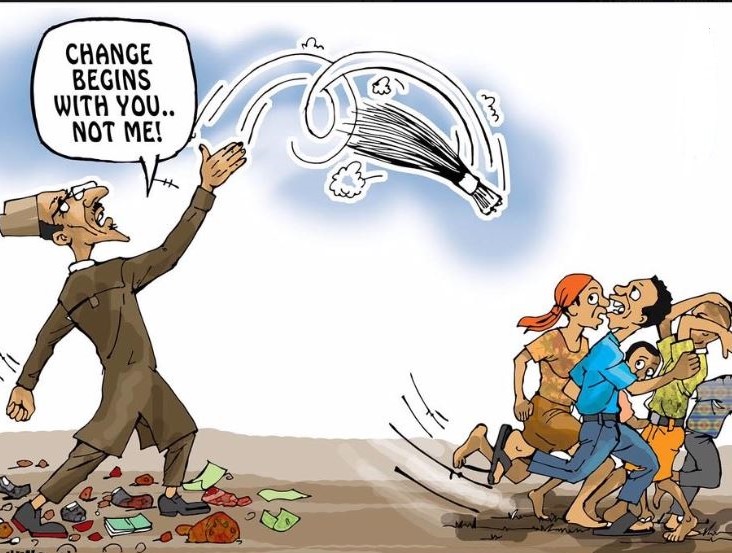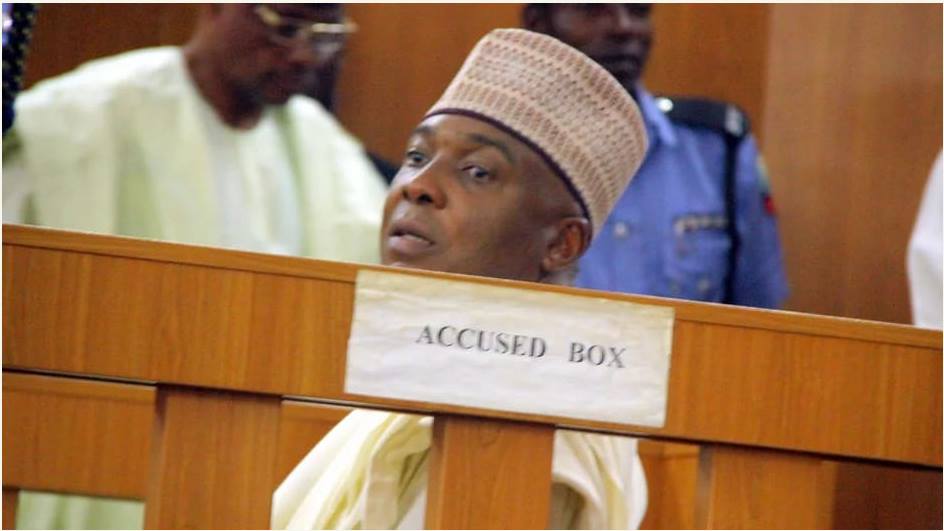
Two years into the four-year term of President Muhammadu Buhari and the APC federal government, it has become clear that the “change” promised is nothing but pure fantasy. Working-class people must organise to end APC rule. PDP is obviously not an alternative. Essentially there is no difference between both parties of the bosses. It is time for us (workers, poor farmers, marginalised women and youth, the urban poor barely getting by, day-by-day) to say enough is enough, rise up and re-order society in the interest of the vast majority of the population.
It is symbolic that the so-called “democracy day” speech was presented by Vice-President Yemi Osinbajo, because the president was once again away on medical vacation. Altogether Mr. Buhari has spent about 100 days out of barely 750 days in government, away to Britain for medical reasons.
Yet, Nigerians do not know his ailment or what these vacations cost tax payers despite N3.87bn set aside for the presidential villa hospital’s capital project in the 2016 budget – an amount higher than that of all the federal teaching hospitals, combined.
Focusing on the three pillars of the “Change” agenda: security, economic improvement and anti-corruption, we find nothing but abysmal failure behind the APC’s propaganda and its attempt to now throw the broom back at us with the slogan of “change begins with you”. As the Centre for Democracy and Development’s “buharimeter” initiative shows, just 2 out of the 222 promises made by the APC when campaigning can be considered met thus far. That is less than 1%!
We are regaled with tales of just how the government has “technically defeated” Boko Haram insurgents. Seizing back territories from the sect (a process which began under the equally bankrupt PDP government) and the recent securing of some of the Chibok pupils freedom are presented as evidence. But, while some progress has been made, this have been far less significant than what is portrayed.
It was not until August 2014 that Boko Haram, inspired by ISIS started laying claim to territories. While its more usual tactics of terrorist violence might have reduced to some extent, these are still significant. Meanwhile, attacks by herdsmen have been on the rise, but “the response of the Nigerian government has been anything but urgent”.
Within the first year of the APC government alone, over 3,000 persons were killed in attacks by either Boko Haram or herdsmen, according to The Punch last year. Since then, not less than 2,000 persons have been killed in different parts of the country including 800 in southern Kaduna and 225 persons in 49 attacks carried out by Boko Haram across all the zones in the north, as well as Lagos in 2017 alone.
And despite the welcome release of over a hundred Chibok pupils, we should not lose sight of the fact that thousands more abducted boys, girls and women remain in Boko Haram’s captivity. In 2015, Amnesty International documented the abduction of “at least 2,000 women and girls…since the start of 2014”. And if the boys kidnapped are added, according to the Wall Street Journal , the total number of those still in captivity could be up to 10,000 persons!
But, beyond insurgency and pastoralists attacks, other forms of insecurity have been on the rise. These include; kidnapping, armed robbery, and human trafficking. And economically, job and income insecurity have now become all pervasive despite the government’s supposed commitment to “economic recovery and growth”.
The past two years have been exceedingly terrible for working class people. There has been no time that public sector workers in up to half of the states have had their salaries paid as at when due. Yet, costs of living have shot through the roof. The excruciating economic hardship has led to dozens of suicides – a development which would have been unthinkable a few years back.
APC is ever quick to place responsibility for this worrisome state of affairs at the doorsteps of the preceding government’s mismanagement, when there were high prices for oil, while extolling its “social intervention programmes”. But, just like when the PDP was in government, a few rich people have continued to get richer while the working masses wallow in deepening poverty. According to Forbes magazine, Nigerian billionaires made more gains than those in any other country in Africa, last year.
In contravention of the Collective Agreement for a five-yearly review of the national minimum wage in 2011, the APC government is yet to commence negotiations for a new minimum wage. Indeed, the federal government tacitly threw its weight behind the state governors’ stance against a wage review. The N5bn welfare projects that APC made a lot of noise about have been disappointingly implemented to the extent that they’ve been implemented at all.
Meanwhile, electricity tariff and fuel pump price have both been hiked by the Buhari presidency. The latter was done more successfully than by any earlier government this century. With confidence that it can still get away with rubbing salt on our wounds, a further N5.00 per litre is set to be added to the price of petrol if a resolution by the Senate is carried. Further electricity tariff hike also appears imminent from the resolutions of a “power sector stakeholders” meeting in May.
The rigmarole fight against corruption has been filled with cases of the more you look, the less you see – including with the monies that EFCC keeps repeating it has found somewhere or the other. Senator Shehu Sani said it all when he pointed out that the APC government fights corruption by other sections of the elite class with insecticide but uses air freshener to “fight” the same spirit of corruption by its own stalwarts.
The recent striking out of all charges against the Senate president, Mr Bukola Saraki, after he settled his squabbles with the presidency only shows us that like Obasanjo, like Buhari.

We have been there before; when Mallam Nuhu Ribadu, the first “anti-corruption czar” was used by the Obasanjo presidency as his political foes nemesis. Because all sections of the bosses are corrupt to the core, it is easy for an anti-corruption war to always find easy victims on “the other side”. But actually, they are all on the same side – they all benefit from and are part of the exploitative and corrupt system of capitalism which we must do away with.
We, as working-class people in Nigeria, are on the same side as the poor working masses across the world, who are once again finding their voice and beginning to unite in the historic fight against the bosses, that our generation faces in this era of crises and revolts.
To win, we must organise politically. Never before has the need for a mass-based working-class people’s party been more pressing. It is encouraging that the Political Commission recently constituted by the Nigeria Labour Congress appears to be taking its tasks more seriously with five meetings in just a few months on the way forward politically, as against the last Commission which hardly met for years.
But, this is not enough. NLC and TUC must seize the moment to arm the working class with a party that brings together all radical forces in the labour movement and rank and file workers, with artisans, poor farmers, youth, women and all marginalised classes and social strata on the basis of a socialist programme that alone can lead to real change borne out of and safeguarding our self-emancipation.








